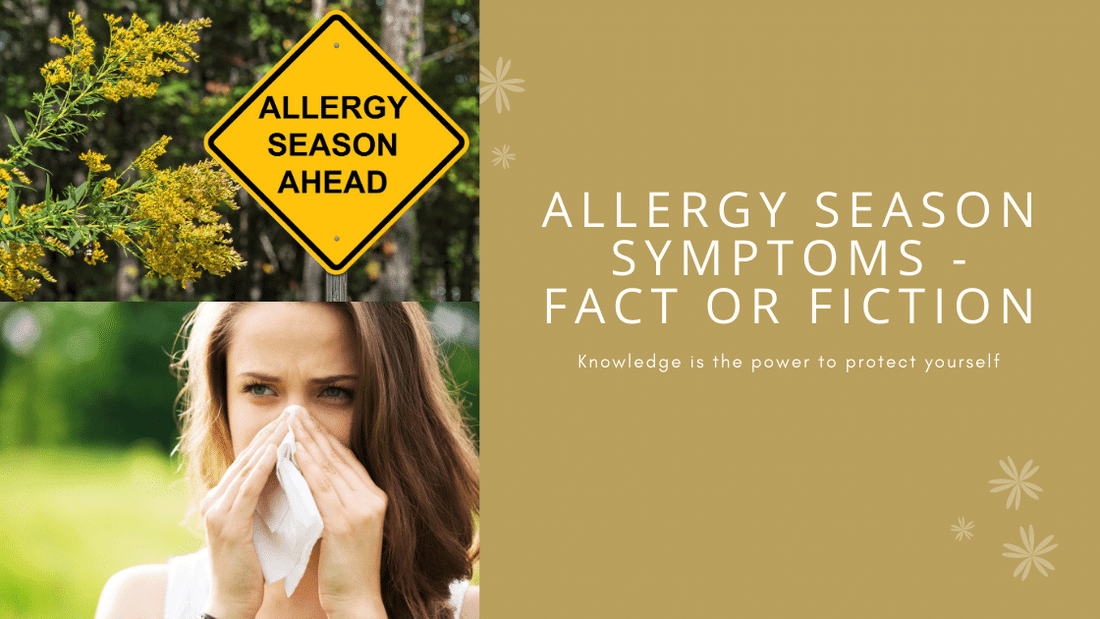Seasonal allergies can be a tricky thing to deal with for anyone. There is a lot of misinformation about what causes seasonal allergies and how to manage them.
My son has some pretty heavy allergy season symptoms. I want to share with you what I have found to be fact or fiction regarding seasonal allergies.
Here are some facts about allergy season symptoms.

FACT #1: Adults can develop new allergies
Everyone does have the ability to develop new allergies at any time. Nobody is immune to new allergy season symptoms. Allergies are a response your body has against unknown substances.
Especially when we get older, our immune system gets weaker. This means it's easier for your allergy season symptoms to trigger.
FACT #2: When older people get a new allergy and allergic reaction, they usually have it at a younger age but forget.
Many allergies remain dormant during childhood. These allergy season symptoms sometimes come back and surprise you later in life. So, it may be if you're feeling an itch or have a runny nose and feel it is not a seasonal allergy.
FICTION #1: Eating local honey can relieve your allergy season symptoms.
Unfortunately, this is a myth. No scientific proof exists that eating local honey helps reduce allergy season symptoms. The theory behind this myth is that local honey contains pollen causing your allergy symptoms. Some believe that eating this honey could build up your immunity as a vaccine would, which is not valid.
Flower pollen is not known to trigger allergies at all. The culprits are usually pollen from grass, trees, and weeds. These allergy-causing pollens are generally never found in unprocessed honey.
While honey tastes great and provides other health benefits, over-the-counter medication is the quickest way to allergy relief.
FICTION #2: using a nasal spray for allergy season symptoms anytime is good for you.
Experts say those little bottles of nasal decongestion sprays can work great but could be harmful if used for long periods. The prescribed nasal sprays contain chemicals that act as anti-inflammatories. They shrink the enlarged blood vessels in your nose, providing welcome relief.
Unfortunately, the nasal spray is like any drug or alcohol. After a few days of using the nasal spray, your blood vessels need to use it more to find the same relief from your allergy symptoms.
Too much use can lead to chronic sinusitis, which means your head and sinuses will feel inflamed for long periods.
If you use too much prescribed nasal spray, you may want to switch to a saline spray that can clean your nose without the side effects.
FICTION #3: Your seasonal allergy symptoms or asthma can be cured.
Unfortunately, there is no cure for allergy symptoms and asthma. You can reduce the symptoms by following a good maintenance plan through prescribed medication.
My son experienced severe asthma when he was a child. As a father, I couldn’t bear to see him gasping, and the long nights at the hospital took their toll. I found that reducing exposure to his spring season allergies was more effective than taking allergy medication.

Some of the allergy symptom relief tricks we used were:
- Stay inside the house on dry or very windy days.
- Stay away from polluted cities that have heavy PM2.5 pollution.
- If you live in a polluted city, use an air purifier at home. Make sure this is a HEPA air purifier and not another gimmicky one.
- Wear a high-quality face mask outdoors, so you don’t inhale the pollen in the air.
- After being outside and entering your home take your clothes off to wash all the pollen or dust so it doesn't trigger your seasonal allergy symptoms.
- Summer is a great time to dry clothes outdoors. When you do this, your clothes gather pollen and dust that can trigger your allergy season symptoms after putting on.
- If you have to work outside, wear an allergy mask, sometimes called a dust or pollen mask. Make sure a face mask is tested to filter out over 95% of PM2.5 particulates or smaller.
- Dust your home often, and pick up the dust off the floor with a good HEPA vacuum cleaner.
- If it is allergy season, keep your air dry by using a dehumidifier and closing all the windows to avoid letting the pollen in.
These tips helped me manage my son’s allergy season symptoms. After I implement these, my son can now live everyday life, and I hope you can do the same.
If you have any questions about allergies or my experience helping my son feel free to contact us at KandyMask.
I know that without a good HEPA air purifier or a high-quality reusable mask, his seasonal allergies in the spring would be much worse.
If you are looking for respiratory protection during allergy season, visit our website at www.kandymask.com to buy one of the best-performing reusable allergy masks on the market. It is the same mask that my son wears.

